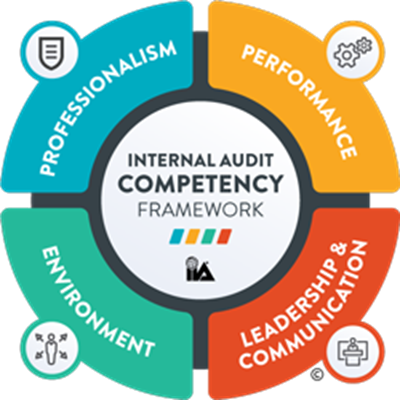The IIA's Internal Audit Competency Framework
Put It To Work
Wherever you are in your internal audit career or whatever the knowledge and skills you seek, the Internal Audit Competency Framework© has a professional development plan that will work for you and your individual needs.
The expert practitioners at The IIA know that professional development isn’t a linear path, but a divergent process with many crossroads and switchbacks.
Reference the table below that clearly outlines the imperative intersections of the three distinct competency levels and four specific knowledge areas. Need help creating your plan? Leverage our Career Planning Toolkit to get started.
We’ve Mapped It Out. You can Make It Work.

| |
Professional Development Resources |
Competency Level |
||
|---|---|---|---|---|
| General Awareness | Applied Knowledge | Expert | ||
|
Professionalism Beyond knowledge and technical skills, professional competency requires a dedication to the profession of internal audit, investment in the practice of internal audit, and a level of ethical conduct that creates trust between internal auditors and organizational stakeholders. Internal auditors provide valuable, independent, and objective analysis and advice that help guide and drive organizations toward higher performance. These courses will help you develop the professional competencies you need to succeed as an internal auditor. |
Certification |
|||
|
Professional Practices/Guidance |
Core Principles for the Professional Practice of Internal Auditing Definition of Internal Auditing International Standards for the Professional Practice of Internal Auditing |
Demonstrating the Core Principles for the Professional Practice of Internal Auditing Implementation Guides for Code of Ethics Principles and Standards |
Creating an Internal Audit Competency Process for the Public Sector |
|
|
Internal Audit Foundation |
Internal Auditing: Assurance and Advisory Services, 4th Edition |
|||
|
Performance Occupations become professions when their policies are codified by professional associations, and internal audit is defined by the International Professional Practices Framework® (IPPF). The IPPF guides internal audit practitioners in planning and performing internal audit engagements, allowing internal auditors to advise management on strategic, system, and operational levels within their organizations. The IIA provides training, based on the IPPF and guidance issued by the IIA, that equips you with the specific skills and knowledge you need to achieve performance competency. |
Certification |
|||
|
Professional Practices/Guidance |
Assessing Organizational Governance in the Private Sector Assessing Organizational Governance in the Public Sector |
Auditing Executive Compensation and Benefits Business Continuity Management |
||
|
Internal Audit Foundation |
Internal Auditing: Assurance and Advisory Services, 4th Edition |
Applying the IPPF, 4th Edition |
Applying the IPPF, 4th Edition |
|
|
Environment Environmental competencies are more than the just the skills employees use each day in a particular organization. In fact, environmental competencies are the industry-wide cross-company universe of skills that allow internal auditors to drive business execution and align with management. Through environmental competencies, internal auditors make sure the organization is positioned to meet its strategic goals in the industry in which it operates. Training from The IIA can help you acquire the skills, information, and appropriate performance measures to help your organization achieve its mission. |
Certification |
|||
|
Professional Practices/Guidance |
Foundations of Internal Auditing in Financial Services Firms |
Auditing Anti-corruption Activities Auditing Third-party Risk Management |
||
|
Internal Audit Foundation |
New Auditor’s Guide to Internal Auditing Data Analysis and Sampling Simplified |
Sawyer’s Internal Auditing, 7th Edition Data Analytics: A Road Map for Expanding Analytics Capabilities Guide to Risk Assessment, 2nd Edition |
Sawyer’s Internal Auditing, 7th Edition |
|
|
Leadership & Communication Leadership and communication competencies help internal auditors understand the strategic context of their organizations, including the internal and external forces that act on the organization. These competencies allow internal audit leaders to clearly and appropriately express information and data to all levels of the organization and lead others to do the same, while actively listening to the ideas and information of other stakeholders. The IIA provides training that will build your leadership and communication competencies, helping you be recognized as a valued advisor who effectively communicates strategic information. |
Certification |
|||
|
Professional Practices/Guidance |
Formulating and Expressing Internal Audit Opinions |
Chief Audit Executives – Appointment, Performance, Evaluation, and Termination |
||
|
Internal Audit Foundation |
||||
Knowledge Areas
Professionalism
- Mission of internal auditing
- Internal audit charter
- Organizational independence
- Individual objectivity
- Ethical behavior
- Due professional care
- Professional development
Performance
- Organizational governance
- Fraud
- Risk management
- Internal control
- Engagement planning
- Engagement fieldwork
- Engagement outcomes
Environment
- Organizational strategic planning and management
- Common business processes
- Social responsibility and sustainability
- Information technology
- Accounting and finance
Leadership & Communication
- Internal audit strategic planning and managemnet
- Audit planning and coordinating assurance efforts
- Quality Assurance and Improvement Program